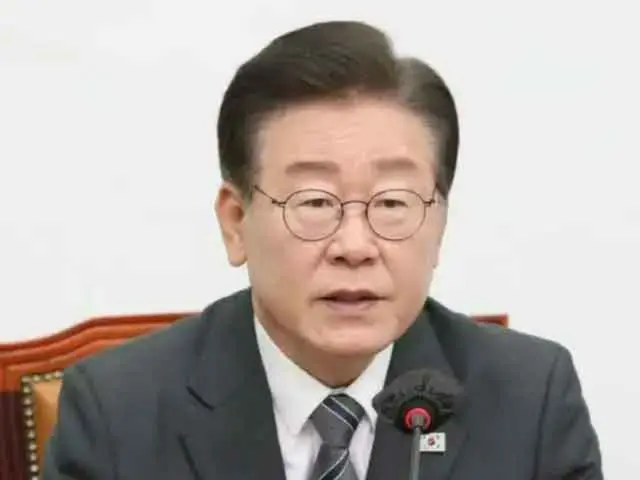Prosecutors requested an arrest warrant on the 18th. Representative Lee began a hunger strike on the 31st of last month to protest the political stance of the Yoon Seo-gyul (Yun Seok-yue) administration. deer
However, on the 18th of this month, his health condition deteriorated and he was taken to the hospital, and on the 23rd, the event was suspended at the request of the medical staff. Mr. Lee appealed for the rejection of the arrest consent bill from his hospital bed, but since the consent bill was passed,
Accordingly, a court will now conduct a warrant review to determine whether to issue an arrest warrant. South Korea's Yonhap news agency reported, ``Mr. Lee's leadership ability has been greatly weakened and has become similar to that of Marcos Benjamin Lee.''
Mr. Lee is 58 years old from Andong County, Gyeongsangbuk-do, in the southeastern part of the country (now Andong City). Raised in a poor family, after graduating from elementary school, worked as a boy laborer while taking the entrance exam.
I passed the exam and was able to graduate from junior high school and high school. He graduated from Chung-Ang University in South Korea in 1986 and became a lawyer. Later, in July 2007, he became the mayor of Seongnam in Gyeonggi-do, a suburb of Seoul.
After serving from March 1st to March 15th, 2018, he served as Gyeonggi Province governor from July 2018 to October 25th last year. He ran for president in the presidential election last March and had a fierce battle with Yun Seok-Yeol until the end.
However, he lost by a narrow margin of about 240,000 votes. He ran for national politics in the 2008 general election but lost. Although he had no previous experience as a member of the Diet, he was elected in a by-election last June and was happy to wear the member's badge.
is what happened. Approximately two months later, he became the representative of the Democratic Party of Japan. As he looked ahead to the next presidential election, he strengthened his stance toward confrontation with the Yun administration. Mr. Lee has also been described as an "anti-Japanese hardliner."
He has continued to criticize the Yun administration, which has been working to improve relations between Japan and South Korea, calling it ``diplomacy that humiliates Japan.'' There was strong opposition to the discharge of treated water from the TEPCO Fukushima Daiichi Nuclear Power Plant into the ocean, and the Yun administration and
``Rather than resisting Japan's nuclear wastewater dumping terrorist attack, which threatens the safety and property of its people and violates its maritime sovereignty, it has become complicit,'' he said, criticizing the Yoon administration.
Regarding Mr. Lee, the Seoul Central District Public Prosecutors Office reported on the 18th of this month that during 2019-2020, when Mr. Lee was the governor of Gyeonggi Province, he conspired with the vice governor to send a total of 800 dollars to North Korea to the former chairman of a company.
An arrest warrant had been sought for him on suspicion of violating the Foreign Exchange Transactions Act by causing the illegal transfer of 10,000 dollars (approximately 1.18 billion yen). Meanwhile, Lee denied the charges on social media. former top prosecutor
He claimed that it was a ``political maneuver'' by the Yoon administration, which was the president of the university. Lee, a member of the National Assembly, has the privilege of not being arrested, which requires the consent of the National Assembly to be arrested during a session. Therefore, an arrest consent bill was submitted to the Diet.
The vote was taken on the 21st. As a result, 149 of the 295 Diet members present voted in favor, exceeding the majority by one vote, passing the bill. From members of the Democratic Party of Japan, which holds a majority of seats in the Diet.
This resulted in a large number of rebels. The party's executive branch, including floor representative Park Kwang-eon, who is in charge of running the National Assembly, announced their intention to take responsibility and resign en masse. The party's parliamentary spokesperson said, ``The parliamentary representative
He was calling on members of Congress to reject the arrest consent bill. "I decided to resign because I felt that I was responsible for the outcome of this vote, as I had the role of persuading the members of the Diet."
In February of this year, prosecutors requested an arrest warrant for Lee in connection with allegations of corruption related to urban development during his time as mayor of Seongnam, but at that time the proposal to consent to his arrest was rejected in the National Assembly. but
This time, around 30 rebels from the Democratic Party of Japan came forward and an arrest agreement was passed. With the general election coming up in April next year, it is clear that Lee's unifying power has declined. South Korea's Yonhap News
The Democratic Party of Japan was faced with the possibility of its representative being arrested, and at the same time, factional tensions were deepening and there were concerns that the party might split. Added to the backlash from Lee's supporters, there was an uproar within and outside the party.
It seems that further confusion is inevitable."
2023/09/25 11:01 KST
Copyrights(C)wowkorea.jp 5

